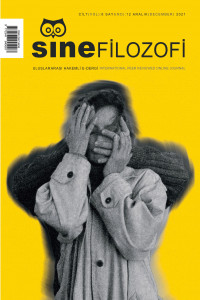Yapay Zekâ Düalizminde Özbilinçlilik Halinin Varlığı ve Yıkımı Üzerine
On the Existence and Destruction Existence of Self-Consciousness in Artificial Intelligence Dualism
Author(s): Mehmet Ali Sevimli, Meral SerarslanSubject(s): Metaphysics, Contemporary Philosophy, Philosophy of Mind, Film / Cinema / Cinematography, Ontology
Published by: Serdar Öztürk
Keywords: Philosophy of Mind; Cinema; Artificial Intelligence; Self-Awareness; Blade Runner;
Summary/Abstract: The effort to understand and explain human nature is one of the oldest intellectual activities of humanity. Modern science has made significant progress in explaining human nature at the point it came. But the paradox that has emerged among scientists for centuries on “the nature of the mind and consciousness” is remarkable. Few things about human existence are as mysterious as mind and consciousness. Philosophy of mind, one of the important areas of contemporary philosophy, is a philosophical discipline that tries to solve this mystery by focusing on the metaphysics and ontological status of the mind. The last point on which the Mind - Body Problem, which has begun to be discussed in a concrete way with the concept of ‘töz dualism’, in which Renê Descartes advocates the separation between mind and body, and is still the subject of debate by contemporary philosophers, is the “artificial intelligence problem”. The most important question here is, Can an artificial mind equivalent to a human mind be produced? Those who answer this question are divided into “weak artificial intelligence” and “strong artificial intelligence” in the context of philosophy of mind. One of the most important dead ends of the front advocating strong artificial intelligence is the ‘state of self-consciousness’, which means confirming the subject’s confidence in himself. This issue is also frequently discussed in motion pictures. In this study, the in 1982 film Blade Runner, directed by Ridley Scott, was examined. The main goal of the study is to determine which of the views of “weak artificial intelligence” or “strong artificial intelligence” the use of artificial intelligence in the film correspond. This, in turn, was done by taking into account the issue of “self-knowledge”. As a result of research designed using the descriptive analysis method, it was found that the use of “artificial intelligence” in the film Blade Runner corresponds to the theory of “strong artificial intelligence”.
Journal: SineFilozofi
- Issue Year: 6/2021
- Issue No: 12
- Page Range: 1005-1024
- Page Count: 20
- Language: Turkish

